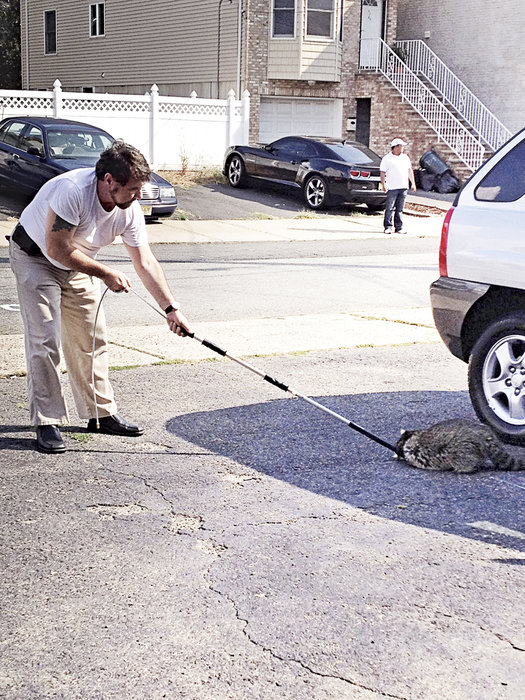A resident called the North Bergen Health Department on Sept. 12 to report a raccoon just blocks from Franklin School that was acting sick that afternoon. As it turned out, the animal carried rabies, a virus that could have killed any child who got bitten.
People who contract the disease must get treatment immediately. The virus causes inflammation of the brain. Once people start showing symptoms, there is no way to stop eventual death.
The call
On Sept. 12 at around 3:30 p.m., Health Director Richard Censullo received an emergency call on his cell phone after leaving his office. A resident told Censullo about a raccoon near 48th Street and Cottage Avenue. Raccoons usually come out at only night, an indication that something was wrong.
Censullo immediately went to the location, a few blocks from the school.
“The animal appeared to be dazed, it was acting like it was drunk,” said Censullo.
The time of the day could not have been worse, as children were walking home from school.
“You can imagine my panic when I see this rabid raccoon in the middle of the street and a bunch of school children walking directly towards it coming home from Franklin School,” said Censullo.
“He was like a shark on the end of a fishing pole.” – Health Director Rich Censullo
____________
“I would not recommend a person who is not a certified animal control officer to attempt to capture an animal that is rabid,” said Censullo. “They are very, very, very unpredictable.”
Censullo captured the animal by approaching it from its blind side and put the rope around the animal’s neck. He has been a health officer for 30 years, but this was his first time snaring a rabid animal.
However, he said that other local officials responded four months ago to a case in which a rabid skunk got into a fight with a cat in North Bergen. The cat received immediate medication and was saved. Humans or animals should receive treatment as soon as possible if bitten.
Censullo said the raccoon was acting erratically and putting the population at risk.
“[The raccoon] backed into a parked car and automatically turned around to bite the tire,” said Censullo. “He was like a shark on the end of a fishing pole. I was worried that he would run in the direction of the children and lash out at the children.”
Once the animal calmed down, Censullo called North Bergen’s licensed animal control officer, Geoffrey Santini from Hudson County Animal Enforcement Inc., who also works for Union City and Bayonne. When Santini arrived, the two men then put the raccoon inside Santini’s truck.
The raccoon was brought to veterinarian Dr. Carlos Triana at Summit Animal Clinic in Union City. Potentially rabid animals are brought to him to be observed for 10 days to see if they show more symptoms. However, this raccoon was put to sleep after a few days, after officials received no reports of it having bitten anyone.
The animal’s body was sent to Trenton, where tests showed it did, in fact, have the disease.
Besides spreading among raccoons and skunks, the virus used to affect the dog population, but dogs are now routinely vaccinated.
Censullo emphasized that anyone who sees a sick or injured animal should contact authorities immediately.
“Every city Health Department has an animal control facility that is available via 911,” said Censullo. “The police dispatchers all have the number for animal control so they can reach an animal control officer all the time. The best thing that people can do is stay as far away from the animal as possible. Any warm blooded mammal can contract rabies.”
Vanessa Cruz can be reached at vcruz@hudsonreporter.com
